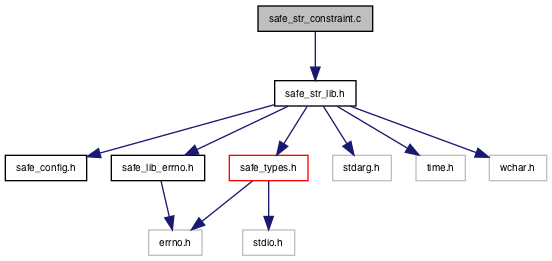#include "safe_str_lib.h" Include dependency graph for safe_str_constraint.c:
Include dependency graph for safe_str_constraint.c:Functions | |
| EXPORT constraint_handler_t | set_str_constraint_handler_s (constraint_handler_t handler) |
| The set_str_constraint_handler_s function sets the runtime-constraint handler to be handler. More... | |
| EXPORT void | invoke_safe_str_constraint_handler (const char *msg, void *ptr, errno_t error) |
| Invokes the currently set constraint handler or the default. More... | |
Variables | |
| static constraint_handler_t | str_handler = NULL |
Function Documentation
◆ set_str_constraint_handler_s()
| EXPORT constraint_handler_t set_str_constraint_handler_s | ( | constraint_handler_t | handler | ) |
The set_str_constraint_handler_s function sets the runtime-constraint handler to be handler.
The runtime-constraint handler is the function to be called when a library function detects a runtime-constraint violation. Only the most recent handler registered with set_str_constraint_handler_s is called when a runtime-constraint violation occurs. When the handler is called, it is passed the following arguments in the following order:
- A pointer to a character string describing the runtime-constraint violation.
- A null pointer or a pointer to an implementation defined object.
- If the function calling the handler has a return type declared as errno_t, the return value of the function is passed. Otherwise, a positive value of type errno_t is passed. The implementation has a default constraint handler that is used if no calls to the set_constraint_handler_s function have been made. The behavior of the default handler is implementation-defined, and it may cause the program to exit or abort. If the handler argument to set_constraint_handler_s is a null pointer, the implementation default handler becomes the current constraint handler.
- Remarks
- SPECIFIED IN ISO/IEC JTC1 SC22 WG14 N1172, Programming languages, environments and system software interfaces, Extensions to the C Library, Part I: Bounds-checking interfaces
- See also
- set_str_constraint_handler_s()
◆ invoke_safe_str_constraint_handler()
| EXPORT void invoke_safe_str_constraint_handler | ( | const char * | msg, |
| void * | ptr, | ||
| errno_t | error | ||
| ) |
Invokes the currently set constraint handler or the default.
- Parameters
-
*msg Pointer to the message describing the error *ptr Pointer to aassociated data. Can be NULL. error The error code encountered.
Variable Documentation
◆ str_handler
|
static |
